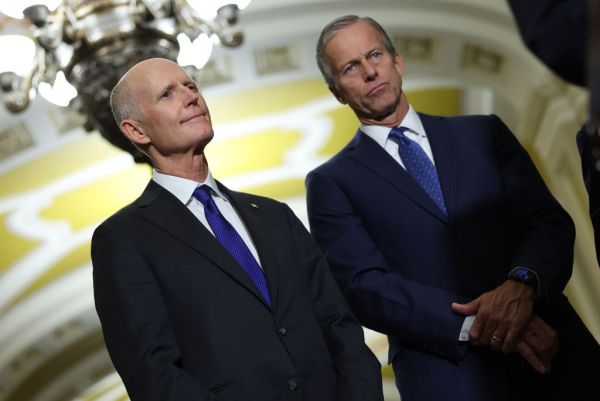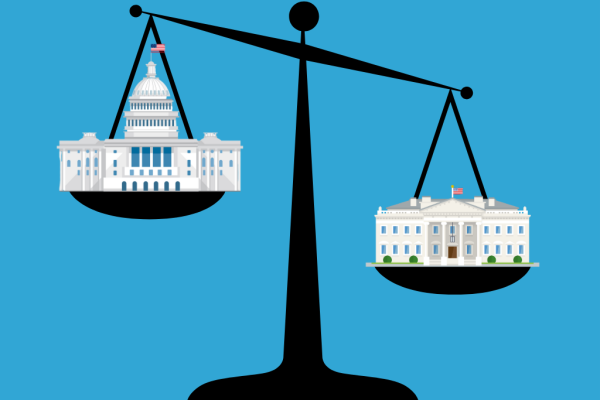Happy Tuesday! We’re looking forward to today’s Dispatch Summit and to meeting so many of you in person. If you see us, come say hi!
Quick Hits: Today’s Top Stories
- President-elect Donald Trump on Monday reportedly named Rep. Mike Waltz of Florida as his national security adviser. Waltz, a retired Army Green Beret, was previously critical of the former president, particularly for his comments about prisoners of war, though in recent years has been a prominent and loyal Trump backer. Waltz has taken an aggressive line on China and has been a member of the House Armed Services, Intelligence, and Foreign Affairs Committees.
- Trump announced Sunday night that Tom Homan—the former acting director of the U.S. Immigration and Customs Enforcement (ICE) in the first Trump administration—will become the “border czar” in charge of border security and Trump’s much-anticipated deportation plan. “I’ve known Tom for a long time, and there is nobody better at policing and controlling our Borders,” Trump wrote in a Truth Social post making the announcement. It’s unclear exactly what form Homan’s position will take, but the announcement suggests he’ll assume a White House role that doesn’t require Senate confirmation.
- Trump on Monday said that Rep. Elise Stefanik, a New York Republican and chair of the House Republican conference, will be his nominee for U.S. ambassador to the U.N., representing the first Cabinet pick of the incoming administration. Stefanik became an outspoken defender of Trump’s stolen election claims in 2020 and ascended to House leadership when former Rep. Liz Cheney was removed as conference chair in 2022. If she were confirmed to fill the post, Republicans would be down a vote in the House until a special election could be held to fill her seat.
- Trump also announced his second Cabinet pick on Monday, tapping former New York Republican Rep. Lee Zeldin to serve as the administrator of the Environmental Protection Agency. “He will ensure fair and swift deregulatory decisions that will be enacted in a way to unleash the power of American businesses, while at the same time maintaining the highest environmental standards,” Trump said in a statement.
- Multiple outlets reported on Monday that Trump is expected to name Sen. Marco Rubio of Florida as his nominee for secretary of state. Rubio—who’s generally considered a foreign policy hawk, though earlier this year he voted against a foreign aid package that included funding for Israel, Ukraine, and the Indopacific—was a staunch critic of Trump when he challenged him for the Republican presidential nomination in 2015 and 2016, but has more recently backed the former president and was considered as a potential running mate earlier this year. If Rubio were nominated and confirmed, Florida Gov. Ron DeSantis, a Republican, could appoint someone to fill his seat until at least the 2026 midterm elections.
- Israeli Foreign Minister Gideon Saar announced Monday that “there is a certain progress” in the U.S.-brokered ceasefire talks with Hezbollah, the Iran-backed terrorist organization in Lebanon. But a spokesperson for Hezbollah said Monday that neither the group nor Lebanon had received an official proposal. Saar’s comments came the day after Israeli Defense Minister Israel Katz announced that the terror group had largely been defeated on the battlefield. Hezbollah launched hundreds of rockets and drones at northern Israel on Monday, and the Israeli military issued more than 20 evacuation orders for areas of southern Lebanon.
- The Israel Defense Force (IDF) said Monday it had expanded a humanitarian zone in southern Gaza to include “field hospitals established since the start of the war, tent compounds, shelter supplies, and provisions of food, water, medicine, and medical equipment.” U.S. Secretary of State Antony Blinken and Defense Secretary Lloyd Austin issued an ultimatum to the Israeli government on October 13, saying Israel had 30 days to increase aid or face restrictions on U.S. military aid. The deadline is Wednesday, and the IDF did not specify how much additional aid would be opened up by the zone’s expansion. The volume of aid flowing into Gaza in October reached the lowest monthly levels since December, according to data from the Israeli agency in charge of facilitating humanitarian relief in Gaza.
Ranked Choice Voting Rankles

On Monday we wrote to you of the recriminations and finger-pointing among Democrats as they grapple with their election defeat last week. In short: It’s ugly.
But ranked choice voting advocates also suffered a pretty serious shellacking on Election Day, though they’re managing to be much less fatalistic about it. “It was a false start down a pathway that people do not like,” Linda Templin, the executive director of Ranked Choice Voting for Colorado, told TMD.
Ranked choice voting has been hailed by its proponents as a reform that could fix democracy. It’s often accompanied by the adoption of “open” primaries (where any voter can vote in either party’s primary) or “jungle” primaries (where candidates from all parties on a list advance to a three-, four-, or five-person runoff). But in seven of the 10 places where voters decided whether to adopt it, ranked choice voting lost. Alaska’s measure is still awaiting a call, although it looks likely to lose there, too.
Voting reform advocates’ limited success is indicative of what may be a discouraging trend for them: difficulty translating the growing success of ranked choice voting in municipal and local elections to larger, statewide, results.
Initiatives related to ranked choice voting and open primaries were on the ballot in Alaska, Arizona, Colorado, Idaho, Missouri, Montana, Nevada, Oregon, and South Dakota last week. While the exact nature of each ballot measure varied slightly, the broad thrust of each measure would move the state to some combination of open primaries and ranked-choice voting.* Missouri is the notable exception, as it passed an amendment preemptively banning ranked choice voting.
Among the only victories? Not a state, but the district of Washington, D.C., where a ballot measure, Initiative 83, led to the adoption of both ranked choice voting and open primary elections, which would allow people not registered as a member of a political party to vote in that party’s primary.
So what is ranked choice voting? Sometimes called “instant runoff,” the system is still relatively unknown to most Americans, and it’s a stark change from the standard paradigm of elections in the U.S.—which is perhaps one of the reasons it’s been slow to catch on. Typically, a representative from each political party—usually the victors of a competitive primary decided by hardcore partisans—face off in a head-to-head general election.
In a ranked choice system, voters rank their preferences—usually three or four—from a list of candidates: Mary, Grayson, and James, for example. Votes are then counted in multiple rounds. Say, for the sake of argument, that Mary was the fewest voters’ first choice. She would be eliminated from the running and the candidates her voters selected as their second choice would receive a tally in their column. That process of vote redistribution continues until one candidate wins an outright majority.
While the process is somewhat confusing, its advocates point out that it fixes some real flaws in established electoral practices. The candidates presented to voters in a general election are usually selected by a highly unrepresentative portion of the electorate: Registered Democrats and Republicans, especially those who choose to vote in primaries, are a small, ideologically committed bunch.
“Voters are tired of picking the lesser of two evils on Election Day,” Templin told TMD. In a ranked choice system, “you simply say who you love, who you like, and who you can live with.”
But in most of the U.S., the “binary choice” paradigm still exists. For example, the current mayor of Philadelphia, Cherelle Parker, won the general election in 2o23 after winning the Democratic primary with only 32 percent of the vote. She cruised to victory over her beleaguered Republican opponent in the general election, refusing to debate him because, she argued, in a city with a seven-to-one voter registration advantage for the Democrats, it would be a “waste of campaign resources.”
Advocates also argue that ranked choice voting incentivizes candidates to build broad coalitions. A candidate in a ranked choice system would theoretically need to be palatable enough to be not just a committed devotee’s first choice, but someone else’s second choice, if they hope to succeed in subsequent rounds. Under that system, then, negative campaigning and extreme positions are much less viable strategies than in a traditional partisan primary.
And until last week, the system’s use had been expanding, particularly in liberal cities and towns. More than 50 cities and municipalities used ranked choice voting, from the city council of Portland, Oregon, to local offices in Memphis, to primary and special elections in New York City. “We’ve gone from 10 cities using it in 2016 to 50 cities and two states using it today,” Deb Otis—the director of research and policy at FairVote, a national organization that researches and advocates for ranked choice voting and proportional representation—told TMD.
And now, Washington, D.C., can be added to that list. “I think a lot of people from across the political spectrum wanted more choice in their elections,” Porter Bowman, the volunteer communications director for the “Yes on 83 Campaign,” told TMD. Bowman noted that the measure enjoyed broad support, winning large majorities in each of Washington’s eight wards. It also has support from a range of progressive advocacy groups, from the Sunrise Movement, to the D.C. Working Families Party, to Democracy D.C.—a group that advocates for progressive causes and statehood for the district.
But entrenched political interests were much less likely to support ranked choice voting and open primaries. The D.C. Democratic Party opposed the measure and the city’s Democratic mayor, Muriel Bowser, said she was “totally against” the reform. “I don’t think that our very good experience with elections suggests that we need to make any change,” she said. Only two members of the 12-member D.C. City Council came out in strong support of the measure: Matt Frumin, a Democrat from Ward 3, and Christina Hendrickson, an at-large independent who had introduced a ranked choice bill in 2021.
“Elected officials wonder how much it will change their campaigns,” Otis told TMD. “They know how to win under the old system.”
Many local and state parties are also waking up to the fact that ranked choice voting could threaten their hold on election processes. Alaska, which adopted ranked choice voting and jungle primaries for national offices, governor, and the state Legislature in 2020, had been considered a poster child by many advocates.
But it’s also been representative of how ranked choice can inspire a determined backlash.
Sen. Lisa Murkowski, a moderate Alaska Republican, lost the endorsement of both the Alaska Republican Party and former President Donald Trump in her 2022 reelection bid after she voted to impeach Trump in 2021. But, with the backing of Senate Majority Leader Mitch McConnell, she ran as an independent Republican, winning a majority after ranked choice tabulation of the votes in Alaska’s top-four jungle primary system.
Murkowski’s victory led the group Alaskans for Honest Elections to introduce Measure 2, which would abolish ranked choice voting in the state. The group adopted the lyrical slogan, “Let’s Take Out the Trash, Let’s Rid the Rank.” Ranked choice proponents claimed Measure 2 was being pushed by outside, Washington-aligned interests; an “incumbent-protection program,” in the words of Murkowski’s 2022 Republican opponent, Kelly Tshibaka. Measure 2 proponents, like ranked choice critics elsewhere, argued that the system is too confusing for many voters and that it led to misleading or unrepresentative outcomes. Phil Izon, one of the leaders of Alaskans for Honest Elections, pointed to a 2022 special election for a House seat in which former Gov. Sarah Palin and Nick Begich, both Republicans, gained more combined first-choice votes than Democrat Mary Peltola, who eventually won the race.
Last week’s anti-ranked choice ballot measure in Alaska gained the endorsements of four state senators and Palin, the first to sign the petition that got it onto the ballot. With 80 percent of the vote counted as of early Tuesday morning, it leads by 1.6 percentage points and seems likely to pass.
The threat to the power of state parties was probably the poison pill for ranked choice and open primary measures. Templin’s organization, for example, remained neutral on Proposition 131, Colorado’s measure that included a top-four, non-partisan jungle primary. She told TMD that the fact that jungle primaries were a deal-breaker for both the state GOP and the state Democrats meant the issue was likely to be doomed all along. “Leave the parties alone,” said Templin. “The problem with top-four primaries is that they eliminate partisan ballot access to the November ballot, so that’s a non-starter for the parties.”
The future, then, for ranked choice advocates might be to moderate their aims, at least at the state level. Templin pointed to Maine’s ranked choice system, which simply implements ranked choice in party primaries and the general election, as a model which could gain more support in the future.
But advocates who spoke to TMD remained optimistic about the election reform’s future prospects. “We’re still seeing tremendous growth for this movement,” said Otis. “ We understand those who have won under the current system are going to extend effort to fight change, but we still think the future is bright.”
Worth Your Time
- Francis Fukuyama wrote an open letter in Persuasion to billionaire businessman Elon Musk, potentially the leader of a future Trump administration commission on government efficiency, on how to make government more efficient. “You will never be able to run the government the way you run your companies,” Fukuyama wrote. “But you can do a lot to make it more efficient. The trick is to avoid simplistic moves like mass layoffs and the closing of entire agencies.” Fukuyama outlined several misconceptions about government inefficiency: “Many conservatives believe that government bureaucrats have too much discretionary authority and use it to enact a liberal agenda, thereby eluding democratic control. This does occur in some instances. But the real truth is rather the opposite: bureaucrats spend way too much of their time complying with hundreds of rules mandated by Congress, rather than using their independent judgment to make decisions that lead to good results for citizens.”
- Writing for Texas Monthly, Benton Graham investigated one Texas high school that has two separate mascots. “In nature, bobcats and deer rarely clash,” he wrote. “A bobcat might attack a fawn, but the feline predator is too small to present much threat to an adult deer. At Comfort High School, the peaceful coexistence of the two animals exceeds that in the natural world. This is because the school, located about fifty miles northwest of San Antonio, has two mascots: a bobcat, for the boys teams, and a deer, for the girls teams.” Over the course of his investigation, Graham discovered additional Texas schools with multiple mascots, “but even if Comfort isn’t alone in having two mascots, the story behind its sports split matters,” he noted. “That tale goes back almost a hundred years, to the school’s girls basketball team at a time when the squad had just one basketball to play with and the girls wore white blouses and black bloomers as uniforms.”
Presented Without Comment
Associated Press: Mattel Says It ‘Deeply’ Regrets Misprint on ‘Wicked’ Dolls Packaging That Links to Porn Site
Also Presented Without Comment
GOP Rep. Tim Burchett of Tennessee to NewsNation on Wednesday’s congressional hearing on unidentified aerial phenomenon (aka UFOs):
I think we’re gonna learn some things. It’s peeling back the layers of an onion.
Also Also Presented Without Comment
Democratic Rep. Pramila Jayapal of Washington on whether she would continue her support for getting rid of the Senate filibuster once Republicans control the Senate in the next term.
Am I championing getting rid of the filibuster now when the [GOP] has the trifecta? No. But had we had the trifecta, I would have been.
In the Zeitgeist
Jazz legend and alto saxophonist Lou Donaldson died Saturday at age 98. Sixty years ago at the Birdland Jazz Club in New York, Donaldson played in one of the first—and considered by many the greatest—live jazz album recordings, A Night at Birdland.
Toeing the Company Line
- In the newsletters: Kevin explored (🔒) what John Adams got right and wrong about democracy, and the Dispatch Politics crew reported on the factions vying to influence the Senate leadership race.
- On the podcasts: Sarah and David discuss the Vacancies Reform Act and who owns engagement rings on Advisory Opinions.
- On the site: Stirewalt checks in on the Senate’s shenanigans, and Alex Muresianu takes a look at Congress’ plan for the coming expiration of the Tax Cuts and Jobs Act.
Let Us Know
Do you favor ranked choice voting? Are you surprised that so many such initiatives failed?
Clarification, November 13, 2024: This newsletter was updated to clarify that some state ballot initiatives would have implemented ranked choice voting or open primaries, not both.











Please note that we at The Dispatch hold ourselves, our work, and our commenters to a higher standard than other places on the internet. We welcome comments that foster genuine debate or discussion—including comments critical of us or our work—but responses that include ad hominem attacks on fellow Dispatch members or are intended to stoke fear and anger may be moderated.
With your membership, you only have the ability to comment on The Morning Dispatch articles. Consider upgrading to join the conversation everywhere.